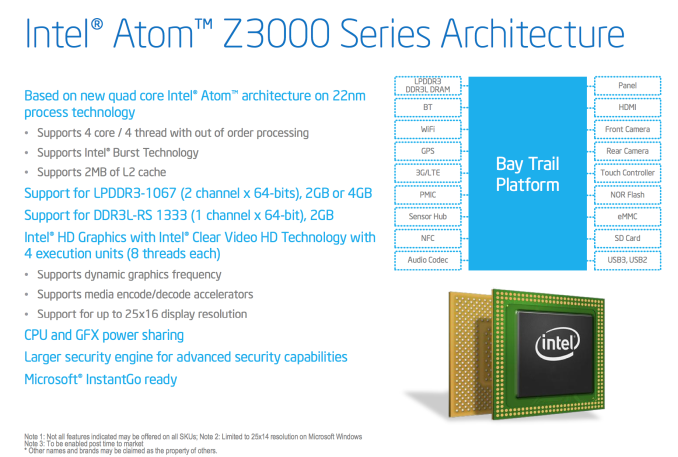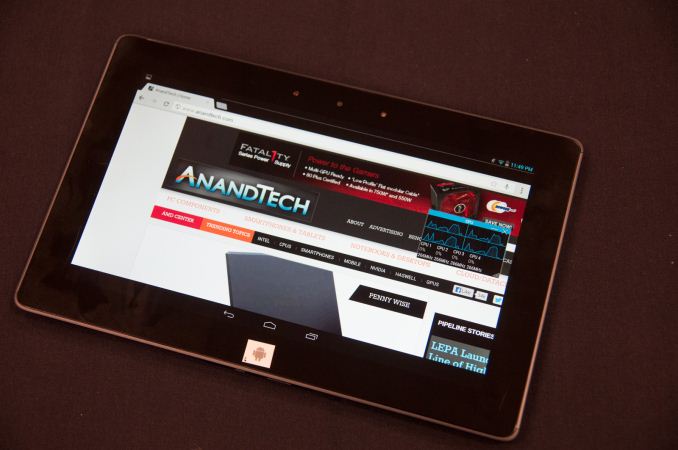The Bay Trail Preview: Intel Atom Z3770 Tested
by Anand Lal Shimpi & Brian Klug on September 11, 2013 12:00 PM ESTFinal Words
At its Silvermont disclosure, Intel promised performance better than any other ARM based core in the market today. Looking at our Android results, Intel appears to have delivered on that claim. Whether we’re talking about Cortex A15 in NVIDIA’s Shield or Qualcomm’s Krait 400, Silvermont is quicker. It seems safe to say that Intel will have the fastest CPU performance out of any Android tablet platform once Bay Trail ships later this year.
The power consumption, at least on the CPU side, also looks very good. From our SoC measurements it looks like Bay Trail’s power consumption under heavy CPU load ranges from 1W - 2.5W, putting it on par with other mobile SoCs that we’ve done power measurements on.
On the GPU side, Intel’s HD Graphics does reasonably well in its first showing in an ultra mobile SoC. Bay Trail appears to live in a weird world between the old Intel that didn’t care about graphics and the new Intel that has effectively become a GPU company. Intel’s HD graphics in Bay Trail appear to be similar in performance to the PowerVR SGX 554MP4 in the iPad 4. It’s a huge step forward compared to Clover Trail, but clearly not a leadership play, which is disappointing.
The big unknowns are things like video decode power efficiency, perf and quality of their ISP and idle power efficiency vs. Qualcomm.
Bay Trail looks like a good starting point for Intel in mobile, and the performance of Silvermont makes me excited for Merrifield in phones next year. What Intel needs to do going forward is simply continue to iterate and execute for the next few generations after Bay Trail and it will have a real chance at success in mobile.
My biggest concern is about the design wins we see based around Bay Trail. Although Intel is finally in a spot where it can be in devices on the market, none of those devices thus far have been any good. Bay Trail is attractive enough to garner more design wins for certain, the question is whether or not the quality of those wins will improve as well. In the tablet market there’s the iPad and the Nexus lines that are really the most interesting, and I don’t expect Bay Trail to be in either. Whether or not the quality of the rest goes up this generation and we find a Bay Trail in one of those devices remains to be seen.












190 Comments
View All Comments
Kidster3001 - Thursday, September 12, 2013 - link
Not to mention that Intel is the largest contributor to AOSP in the world... and has been for a few years now.dwade123 - Wednesday, September 11, 2013 - link
RIP ARM.Anders CT - Wednesday, September 11, 2013 - link
Who do you think will use Bay Trail rather than, say, a Snapdragon in their devices?virtual void - Wednesday, September 11, 2013 - link
Anyone that understands the value of really good single-threaded performance on integer workloads as that is by far the most important property for a tablet would be stupid not to select Bay Trail.Almost every single Android application runs on x86 based Medfield phones, so compatibility with existing Android-applications is a non-issue.
It comes down to price of the device, if the Silvermont based Android tablets end up at roughly the same price, why wouldn't I want the better performing one (battery life seems to be about the same)?
Anders CT - Wednesday, September 11, 2013 - link
I see two problems with this: The apps where single-threaded performance is critical, is the very apps that are likeely to contain optimized native code.Second: I doubt that Bay Trail while be competitive on price, especially if you factor in the apparent lack of on-chip LTE and Wifi modems.
Maybe we will se a lot of Android laptops (I'm writing this on Android laptop with Tegra 4 btw), but on a bigger screen you tend to be pushing a lot of pixels, and then you need a bigger GPU.
I'm not saying that Bay Trail will be a failure. I just don't see a lot of reason for OEMs to jump ship on Qualcomm.
Dentons - Wednesday, September 11, 2013 - link
Intel isn't going to kill ARM. While Intel is finally releasing a product that's competitive with ARM, it's probably five or six years too late. To paraphrase from above, convincing existing ARM vendors to move to Intel will not be an easy task. There will be huge costs involved in any such move.In order to convert ARM customers, Intel would need either far better performance or far better price points, and probably both. It seems unlikely that Intel has either.
Even with these latest chips, Intel's performance is only minimally better than ARM's current offerings, and while we don't know pricing, given that Intel has the highest margins in the industry and ARM among the lowest, one must assume that Intel's new silicon won't be price competitive with ARM.
Further, this chip's stand out feature is its X86 compatibility, something neither of the top mobile operating systems require or desire. ARM also allows mobile manufacturers a large, competitive marketplace from which to purchase CPU's. Were tablet manufacturers to spurn ARM, they'd drop themselves right back into Intel's high-margin arms.
These chips seems specifically designed to kill off Windows RT. In that alone, they'll probably succeed. Gaining real market share from ARM would require robust X86 versions of iOS and Android. While X86 Android does exist, almost entirely due to work by Intel themselves - there are tremendous application issues. Google seems unlikely to do much of the heavy lifting, the development would continue to be almost entirely the responsibility of Intel.
ARM has a massive lead. To keep that lead ARM just needs to stay good enough. ARM can win by staying reasonably competitive with Intel's performance while continuing to destroy them on price. Unless Intel brings both massive performance gains and tremendous price reductions, it won't be worthwhile for the big existing ARM players to lift heaven and earth to support X86.
Intel's only hope is X86 Windows 8 for tablets takes off. Good luck with that. Devices with a full WinTel tax will never be cost competitive with ARM / Android.
zeo - Wednesday, September 11, 2013 - link
Intel already got the ATOM within less than $10 to no more than $20 more than an ARM SoC for the ATOM SoC... And Bay Trail will be priced even lower than the present ATOM!And they already are competitive on power efficiency, leaving performance as the last thing they needed to excel at and Bay Trail looks to get enough for it to count...
Mind, Intel doesn't have to deal with hardware fragmentation as their own driver support for their own GPU is far better than most of the closed drivers used for the proprietary graphics used by the majority of ARM devices.
And people are more used to using desktop Linux on Intel systems anyway... So don't underestimate their chances too much, they're far from terrible...
TheinsanegamerN - Wednesday, September 11, 2013 - link
see, her is the issue. 10-20 bucks more means the chip is wither 50% or 100% more expensive then the competitor, and offers only a small improvement performance wise. add in atom's tainted name, its no wonder that OEMs dont want to use atom as much as, say, qualcomm chips.TheinsanegamerN - Wednesday, September 11, 2013 - link
*here, not herNagorak - Thursday, September 12, 2013 - link
And how exactly do you know that OEMs don't want to use Intel chips? Because the day it's announced there aren't tons of Atom based tablets available in the store?Samsung even used the old Atom in their Galaxy Tab 3, and this Atom is like three times better. The idea that OEMs are going out of their way to avoid Atoms is not reality.